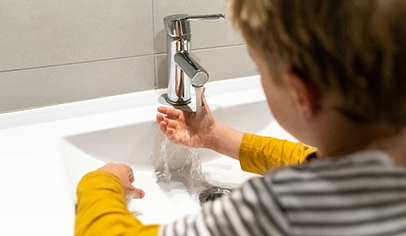Help Your Kids Stay Happy and Healthy at School
If you have children in school, you know how easily they seem to get sick. You can help minimize sickness with some reminders about ways your child can stay healthy at school.
January 22, 2021

Joaquin Corbalan/123RF
Keeping school-age kids healthy isn’t always easy. Some estimates say school-age kids can get up to eight colds a year in addition to other illnesses they may catch. But there are ways kids can help reduce their chances of getting sick.
This winter, with cases of COVID-19 at a high, it’s more important than ever to stress healthy habits to students. In addition to following your district’s protocols for COVID-19 safety, be sure to tell your kids to:
Wash their hands—a lot! Everyone should wash their hands with soap and water after they sneeze, cough, or use the bathroom, and always before they eat. They should also use an alcohol-based hand sanitizer frequently throughout the school day.
Say no to sharing food. As tempting as it seems for kids to sample others’ snacks and drinks, they need to know they could end up really sick—their friends might not yet know they are sick and might pass along germs.
Never set down food on a surface like a desk or cafeteria table. Those kinds of surfaces are often covered with germs. If your child has to put down her food, tell her it’s best to do so on a napkin or plate.
Avoid sharing personal items like combs, brushes, or earbuds. Any personal items can transmit germs, and combs and brushes can also harbor lice.
Avoid touching their eyes and nose as much as possible. Touching the face transmits any germs on the hand, and also transmits germs from the eyes and nose to anything else they touch. If your child needs to touch or rub his eyes or nose, tell him to use a tissue.
Cough or sneeze the right way. While some people think the right way is to cover their nose and mouth with their hands, it’s much better to cough or sneeze into a sleeve or the crook of the elbow. That way, none of the germs will spread to your child’s hands (and to other people).
Visit the nurse if they’re not feeling well. Some kids are shy about doing this, but it’s important for them to know that’s what the nurse is for—to help them feel better and to minimize the illness that might be spread if they stay in school while sick.
Be mindful of gym germs. This is especially important for student athletes, who spend a lot of time in the locker room. But all kids need to know the importance of washing their hands immediately after being in the gym and not sharing personal items like deodorant, towels, or razors.
Drink plenty of water throughout the day. Forgetting to drink during the school day can lead to dehydration, which can cause dizziness and headaches. Pack your child a full water bottle from home, and tell her to take sips frequently throughout the day.
At lunchtime, don’t skip the fruits and vegetables! A big part of staying healthy is eating the right foods, so every day make sure you try to pack fruits and vegetables in their snacks and lunches.
Take personal responsibility where germs are concerned. This could mean wiping down a sneezed-on surface with a disinfectant wipe or making sure the teacher knows there’s been an illness in the family.
Be as careful as possible at germ “hot spots” in the school—places where lots of kids tend to gather, like cafeteria tables, library tables, and computer stations. No one can really avoid those places, but a little awareness—like washing hands after using shared devices, for example—can go a long way.
Get your child's exact back‑to‑school supply list, right from their teacher.



